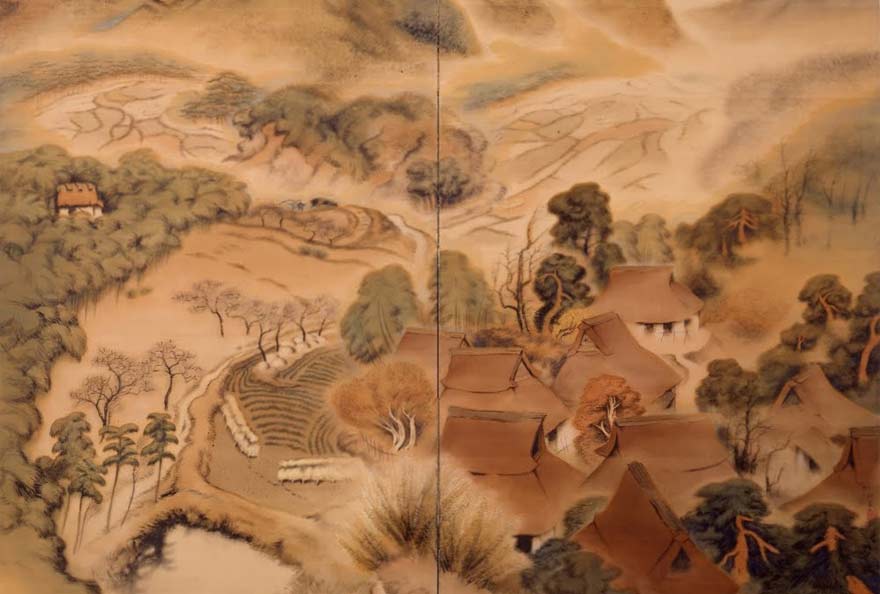Augustin Berque is an eminent French geographer and philosopher, who has made a major contribution to the revival of landscape thinking. He has made his own research and suggestions on the harmonious coexistence between nature and man, based on the concept "the Earth as our environment fūdo". This year, the International Cosmos Prize is awarded to him in recognition of his outstanding achievements in establishing a unique environmental anthropology. Based on the Eastern vision of nature and corroborated by his field work in Japan, China, Mongolia, etc., this unique discipline differs from conventional environmental sciences and ethics, which are built on the Western vision of nature.
After Jared Diamond, Daniel Pauly, E.O. Wilson, Philippe Descola, Jane Goodall..., the philosopher and geographer Augustin Berque received the Cosmos 2018 Prize - sometimes called the "Nobel Prize for Ecology". How can we define Dr. Berque's environmental anthropology? He seeks to reconsider the relationship between nature and mankind to provide us with a new and essential philosophical perspective that will help us determine a better direction for the survival of humanity in the future.

Augustin Berque was a professor at the École des hautes études en sciences sociales (EHESS) in France for many years. He also spent more than twelve years in Japan conducting research and education activities. This experience allowed him to become familiar with the culture and history of Japan. Deeply inspired by Fūdo : the human environment, written in 1935 by the great Japanese philosopher... Tetsurō Watsuji (1889-1960), Dr. Berque translated this book into French (CNRS Editions). In elaborating, deepening and evolving the concept of Watsuji's Fūdo, Berque organized his own reflection on landscapes, in order to develop a new academic discipline called "mesology" (fūdogaku).
Rather than a discipline that would be a phenomenological ecology, mesology should be considered as a general perspective, permeating modern dualism. For mesology, reality, the reality of concrete environments, is neither properly objective, nor properly subjective, but rather is the reality of the world. trajective.
This concerns both the natural sciences and the humanities. Being both ontological and logical, the new perspective that mesology brings is onto-logical. Going beyond the classic modern paradigm, this new perspective is imposed, at a time when the abstraction of dualism, together with the principle of the excluded third party, with its various attributes (mechanism, reductionism, analyticism, individualism, capitalism, industrialism...) has come to cause not only what is now called the Sixth Extinction of Life on Earth, but also decomposes the social bond and devastates landscapes; in other words, has led to a loss of cosmicity that could well be fatal to us. Reconstructing human existence, re-creating it, re-engaging it with the Earth, this is the triple objective of mesology (Mesology Glossary by Augustin Berque - Editions Eolienne).
Furthermore, based on the theoretical results of mesology, Augustin Berque proposed a theory on the subjectivism of nature, according to which nature has subjectivity, while critically overcoming anthropocentrism in nature-culture dualism and environmental ethics. Traditional environmental ethics unilaterally asserts the protection of the natural environment, based on human subjectivity alone.
On the other hand, his theory of subjectivism of nature based on non-anthropocentrism argues that the subjectivism of man and nature must be recognized, and that we must aim to re-establish the relationship between nature and humans.
As a result, this theory has given a revolutionary perspective to environmental thinking. Augustin Berque's notion raised strong objections to critics who view the theories of fūdo as a whole as environmental determinism, which has an impact on the theory of life on our planet, the biological sciences, and Western philosophy and science.
Dr. Berque emphasizes a fundamental distinction between the environment and fūdo (middle). The former is on the natural physical or ecological level, while the latter is both physical and sensory. In other words, while the environment can be studied scientifically as an object, fūdo (environment) is charged with human subjectivity, and therefore considered to be formed between a subject and an object.
In other words, Dr. Berque's mesology draws a line between itself and the environmental sciences and Western perspectives, which are based on the premise of a choice between the physical and the sensory. In his notion, he consistently maintains a critical attitude towards modern mentalities, pointing out that the underlying cause of global environmental devastation is the fact that modern subjects have denied their mediumnity (fūdosei). This viewpoint has some similarity with traditional Japanese thinking and practices, which have sustainable cultural aspects such as satoyama and satoumi (respectively, natural forests and coastal areas that are linked to the lives and livelihoods of local people).

It also has something in common with the oriental vision of nature, which aims to live in perfect harmony with nature. This notion is reflected in his book The Landscape in Japan, Europe, and the age of landscaping.
Drawing on the theory of mesology, Augustin Berque re-examined the concepts around nature and the subject, coming to the conclusion that, unlike machines, nature should be subjected, in some form and to some extent, as long as it is alive. In other words, he considers that nature as a living entity has its own subject that determines its meaning, namely the direction it should take.
Since the 2011 earthquake in the Great East of Japan, Augustin Berque has often visited the affected areas and participated in numerous symposiums in the country. At the same time, he has given valuable advice on reconstruction plans for the affected areas, using the keyword sappukei (literally "killing the landscape", in the contemporary Japanese sense of "dull, desolate, etc."), as well as the keyword sappukei (literally "killing the landscape", in the contemporary Japanese sense of "dull, desolate, etc."). « ). This is an example that demonstrates the usefulness of the theories on fūdo in finding solutions to specific problems.
Augustin Berque has just translated the latest work of Imanishi Kinji, one of the companions on the road of his immense work, which proposes to look at the Earth as fūdo."Freedom in Evolution" edited Wildproject.
Source : International Cosmos Prize

Last works of Augustin Berque :
- Landscape ThinkingParis, Archibooks, 2008
- (direction, with Philippe Bonnin and Alessia De Biase) Inhabiting it in its original poeticsParis, Donner lieu, 2008, 404 p.
- Is a city being rebuilt?Paris, L'Harmattan, 2009, 142 p. (Géographie et cultures No. 65, Spring 2008).
- Being towards life. Ontology, biology, ethics of human existence. Proceedings of the Cerisy-la-Salle Symposium, Ebisu No. 40-41, Fall 2008-Summer 2009, 224 p. With Nathalie Frogneux, Britta Stadelmann and Suzuki Sadami.
- History of the ideal habitat. From East to WestParis, Le Félin, 2010, 399 p.
- Environment and human identity. Notes for a transcendence of modernityParis, Donner lieu, 2010, 150 p.
- (Translation and glossary of) Watsuji Tetsurô, Fûdo. The human environmentParis, Éditions du CNRS, 2011, 330 p.
- Giving place to the world: the poetics of inhabiting itParis, Donner lieu, 2012, 402 p. With Philippe Bonnin and Alessia de Biase)
- Poetics of the Earth. Natural and human history, essay of mesologyParis, Belin, 2014, 237 p.
- Mesology, why and for what?Nanterre La Défense, Presses universitaires de Paris Ouest, 2014, 77 pp.
- The Link to PlaceBastia, Éditions Éoliennes, 2014, 304 pp.
- Impressed forms, matrix forms, East AsiaFranciscopolis editions, The presses of reality (ISBN 978-2-9544208-5-1), 2015, 63 p.
- Landscape Thinking (new edition), Bastia, Éditions Éoliennes, 2016, 128 p.
- There, on the banks of the Yvette river - Mesological DialoguesBastia, Éditions Éoliennes, 2017, 120 pp.
- Mesology GlossaryBastia, Éditions Éoliennes, 2018, 48 pp.
To go further :
- Book "Vocabulary of Japanese Space" - The grammar of space - CNRS Editions
- Book" A New Earth - For another relationship to the world "by Dominique Bourg - Editions Desclée de Brouwer, 2018
– Conference text of Augustin Berque on May 15, 2018 in Vitrolles
Header photo : Fukakusa Landscape, South of Kyoto Dinstinct - Collection of the Kyoto Prefectural Domoto-Insho Museum of Fine Arts












